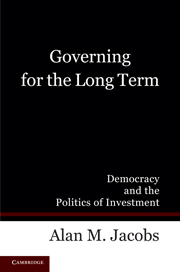Book contents
- Frontmatter
- Contents
- List of Figures and Tables
- Acknowledgments
- PART I PROBLEM AND THEORY
- PART II PROGRAMMATIC ORIGINS: INTERTEMPORAL CHOICE IN PENSION DESIGN
- Introduction
- 3 Investing in the State
- 4 The Politics of Mistrust
- 5 Investment as Political Constraint
- 6 Investing for the Short Term
- PART III PROGRAMMATIC CHANGE: INTERTEMPORAL CHOICE IN PENSION REFORM
- PART IV CONCLUSION
- Bibliography
- Index
Introduction
Published online by Cambridge University Press: 05 June 2012
- Frontmatter
- Contents
- List of Figures and Tables
- Acknowledgments
- PART I PROBLEM AND THEORY
- PART II PROGRAMMATIC ORIGINS: INTERTEMPORAL CHOICE IN PENSION DESIGN
- Introduction
- 3 Investing in the State
- 4 The Politics of Mistrust
- 5 Investment as Political Constraint
- 6 Investing for the Short Term
- PART III PROGRAMMATIC CHANGE: INTERTEMPORAL CHOICE IN PENSION REFORM
- PART IV CONCLUSION
- Bibliography
- Index
Summary
What was at stake in social politics at the dawn of the welfare state? Most welfare-state scholars have described the birth of social programs as the development of a set of rules governing the redistribution of resources across individuals and groups. “…[W]hatever form it takes, the distinguishing mark of social policy seems to be its character as a unilateral transfer, in contrast to the bilateral exchange of the market,” writes Hugh Heclo (1974, 2) in the opening chapter of his classic treatment of the early politics of social protection. Heclo characterizes the construction of the modern welfare state as a fundamental change in the conditions under which individuals could claim resources from governments, “an expansion of state transfer programs from the narrow and disqualifying relief of the poor law to a vast range of transfers by right”. Peter Baldwin (1990), in his masterful comparative study of the politics of social insurance, similarly identifies at the core of political conflict over social policy a redistributive tug of war. “…[A]pproached from the right angle,” he writes, “the nuts and bolts of social policy testify to the heated struggles of classes and interests”. In Baldwin's view, battles among workers, employers, and early social policy makers over the structure of welfare state programs were primarily “disputes among groups for redistributive advantage, contests over solidarity…”.
- Type
- Chapter
- Information
- Governing for the Long TermDemocracy and the Politics of Investment, pp. 75 - 77Publisher: Cambridge University PressPrint publication year: 2011



